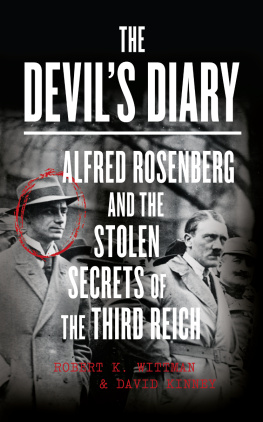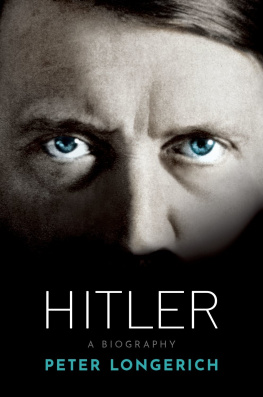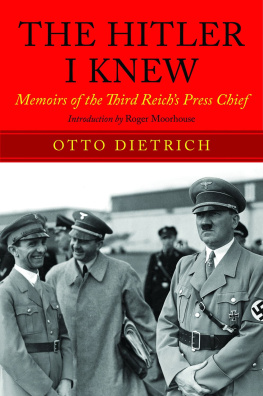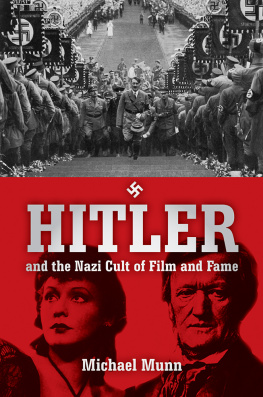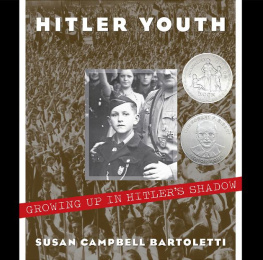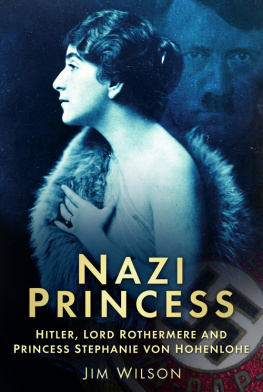GO-BETWEENS FOR HITLER

Great Clarendon Street, Oxford, ox 2 6 dp , United Kingdom
Oxford University Press is a department of the University of Oxford. It furthers the Universitys objective of excellence in research, scholarship, and education by publishing worldwide. Oxford is a registered trade mark of Oxford University Press in the UK and in certain other countries
Karina Urbach 2015
The moral rights of the author have been asserted
First Edition published in 2015
Impression: 1
All rights reserved. No part of this publication may be reproduced, stored in a retrieval system, or transmitted, in any form or by any means, without the prior permission in writing of Oxford University Press, or as expressly permitted by law, by licence or under terms agreed with the appropriate reprographics rights organization. Enquiries concerning reproduction outside the scope of the above should be sent to the Rights Department, Oxford University Press, at the address above
You must not circulate this work in any other form and you must impose this same condition on any acquirer
Published in the United States of America by Oxford University Press 198 Madison Avenue, New York, NY 10016, United States of America
British Library Cataloguing in Publication Data Data available
Library of Congress Control Number: 2014959993
ISBN 9780198703662
ebook ISBN 9780191008689
Printed in Italy by L.E.G.O. S.p.A.
Links to third party websites are provided by Oxford in good faith and for information only. Oxford disclaims any responsibility for the materials contained in any third party website referenced in this work.
Praise for Karina Urbach
Queen Victoria:
This clever and enlightening biography of Queen Victoria is a gripping read. With humour and psychological expertise Karina Urbach portrayssupported by a multitude of documentsan impressive portrait of this woman.
Christopher Clark, University of Cambridge
This short and readable biography of Queen Victoria is a remarkable achievement. First and foremost, it is a masterpiece of a biographical miniature, not in terms of its scholarliness, insight or intellectual powerall of which are by no means in short supply given its proportions. Rather, it manages to be readable, clear, interesting, witty and brief, and yet also important. The failure of academic historians to consider Queen Victoria seriously has meant she has been enigmatic to date. A triumph of Karina Urbachs book is that, by its end, if anything, Victoria has become more seriously and urgently so.
John Davis, Sehepunkte
A little masterpiece
Andreas Rose, Historische Zeitschrift
Bismarcks Favourite Englishman:
Karina Urbach has managed to bring together an impressive amount of new evidence She gives us a balanced, carefully researched and gracefully written account of personalities and policies.
James J. Sheehan, Times Literary Supplement
Karina Urbach has a light touch and a sharp eye. She provides vivid portraits of William I, Berlin in the 1870s and the great Bismarck, with whom Russell had a close relationship. Here is a work which is a sheer delight to read.
Jonathan Steinberg, University of Pennsylvania, and author of Bismarck: A Life
Preface
Many of us have been go-betweens at one time or another in our lives. We may have conveyed messages between siblings, parents, or friends after a misunderstanding or argument. But go-betweens not only exist on a personal level, they are also employed in high politics, well hidden from the public eye. Right now they may be working where official channels have become stuck.
Go-betweens are not an invention of the twenty-first century, they have existed for a long time. Those in power who have launched go-between missions over the last century have done so regardless of the form of government. But a common thread existed when it came to choosing the ideal person for such missions: up to 1945 they were mainly members of the aristocracy from every corner of Europe. Only after the Second World War were these people replaced by international businessmen, secret servicemen, and journalists.
In the American television series House of Cards, the Vice-President snarls at a congressional inquiry: When a back channel becomes public, it defeats its purpose. It has been my purpose for the last five years to highlight the role of the back channel in the first half of the twentieth century. This book uses new sources found in thirty archives in the United States, Britain, Germany, the Netherlands, and the Czech Republic.
It has been a pleasure writing this story because it gave me a chance to meet real life go-betweens. Following James Watsons advice avoid boring people, I have been spoilt with wonderful friends and colleagues. This is a, probably, incomplete list of them: Denys Blakeway, Gerry Bradshaw, Christopher Clark, Matthew Cotton, Shawn Donnelley, Andreas Fahrmeir, Otto Feldbauer, Lothar Gall, Ulrike Grunewald, Stefan Halper, Klaus Hildebrand, Paul Hoser, Eva Klesse, Jeremy Noakes, Klaus Roser, Jonathan Steinberg, the Stolzenbergs, Natascha Stber, Miles Taylor, the Unholzers, Adele Warner.
The Austrian novelist Thomas Bernhard coined the idea of Lebensmensch. I have had three such people in my life: my mother Wera Frydtberg (2008), who was not just a great actress but also the most enchanting person I have ever met; my son Timothy, and my husband Jonathan Haslam, who have made me so happy.
London, June 2015
Contents
Princess Beatrice (Spain), Princess Victoria Melita (Russia), Princess Alexandra (Germany) and Crown Princess Marie of Romania in 1900.
In the summer of 1940 a bizarre incident occurred at the GermanItalian borderthe Brenner. In July the 83-year-old Duchess in Bavaria was refused permission to return to the German Reich. She was stuck in Italy and tried for months to get back to her home in Bavaria. Her aristocratic friends and relatives as well as the German embassy in Rome tried their best to help her. The ambassador Hans Georg von Mackensen explained the case of the displaced duchess to the German Foreign Ministry: she had travelled to Italy for the sole purpose of supporting her granddaughter, the Italian Crown Princess, during the last stages of her pregnancy.
This family friendly explanation did not have much effect in Berlin, though. Because nothing was done in the following months, the visit of the duchess threatened to turn into a serious diplomatic incident between Germany and Italy. Only when the esteemed Nazi Prince Philipp von Hessen intervened did things start moving again. Hessen used pragmatic arguments vis--vis Berlin: as long as the Bavarian duchess was stuck at the border, the Italian royal family had to pay for her costly maintenance. This financial burden was seen as a great nuisance. In October 1940 the displaced Duchess was allowed to re-enter Germany. It turned out that she was not the only member of the higher aristocracy who was in trouble at the border. Over the following years the embassy in Rome was kept busy trying to help other German aristocrats get home.
So what was the regime afraid of? This book will show that the Nazi leadership feared the higher aristocracy because it had used their international networks for years and it therefore knew of their great potential. Members of the aristocracy had worked as go-betweens for Hitler and established useful contacts with the ruling elites of other countries. By 1940 the regime feared that these networks could also work against them.






